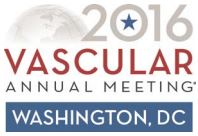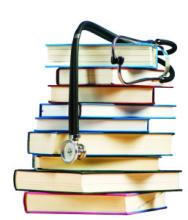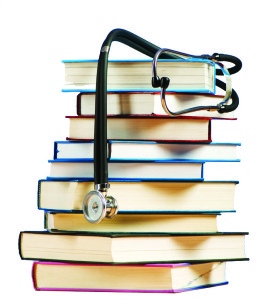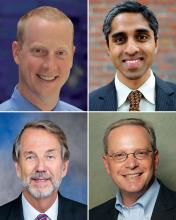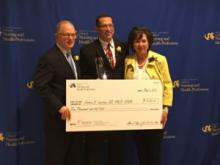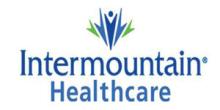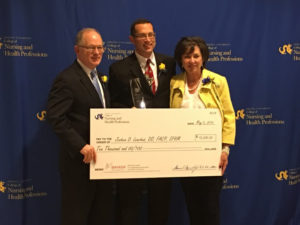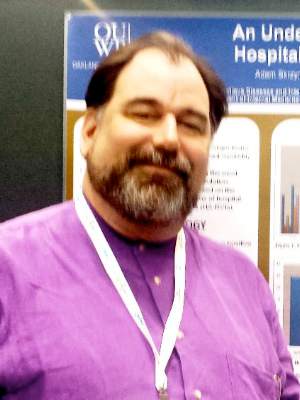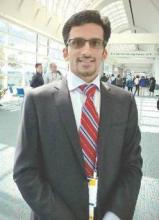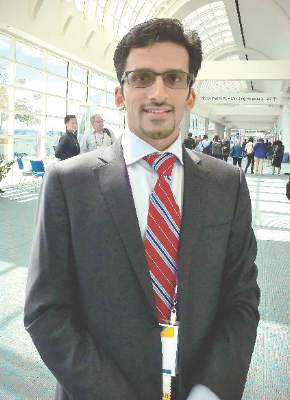User login
Member Decisions Coming July 1
We understand membership applicants are anxious for a decision!
Check your mailbox. All those who submitted applications to be members of SVS will receive a letter about the membership decision around July 1.
We understand membership applicants are anxious for a decision!
Check your mailbox. All those who submitted applications to be members of SVS will receive a letter about the membership decision around July 1.
We understand membership applicants are anxious for a decision!
Check your mailbox. All those who submitted applications to be members of SVS will receive a letter about the membership decision around July 1.
New SVS Officers Elected at Annual Meeting
At the Vascular Annual Meeting last week, members voted on new officers and approved selection of new members of the Board of Directors.
Officers elected are:
• Vice president, Dr. Michel Makaroun
• Secretary, Dr. Ali AbuRahma
• Treasurer, Dr. Kim Hodgson
New members of the Board of Directors are:
Dr. Frank Pomposelli, Clinical Practice Council chair
Dr. Michael Golden, Eastern Vascular Society
Dr. Thomas Forbes, Canadian Society for Vascular Surgery
Dr. Donald Jacobs, Midwestern Vascular Surgical Society
Dr. William Marston, Southern Association for Vascular Surgery
Dr. Thomas Bower, Society for Clinical Vascular Surgery
Dr. Darrin Clouse, Vascular and Endovascular Surgery Society
Dr. William Jordan, Association of Program Directors in Vascular Surgery.
At the Vascular Annual Meeting last week, members voted on new officers and approved selection of new members of the Board of Directors.
Officers elected are:
• Vice president, Dr. Michel Makaroun
• Secretary, Dr. Ali AbuRahma
• Treasurer, Dr. Kim Hodgson
New members of the Board of Directors are:
Dr. Frank Pomposelli, Clinical Practice Council chair
Dr. Michael Golden, Eastern Vascular Society
Dr. Thomas Forbes, Canadian Society for Vascular Surgery
Dr. Donald Jacobs, Midwestern Vascular Surgical Society
Dr. William Marston, Southern Association for Vascular Surgery
Dr. Thomas Bower, Society for Clinical Vascular Surgery
Dr. Darrin Clouse, Vascular and Endovascular Surgery Society
Dr. William Jordan, Association of Program Directors in Vascular Surgery.
At the Vascular Annual Meeting last week, members voted on new officers and approved selection of new members of the Board of Directors.
Officers elected are:
• Vice president, Dr. Michel Makaroun
• Secretary, Dr. Ali AbuRahma
• Treasurer, Dr. Kim Hodgson
New members of the Board of Directors are:
Dr. Frank Pomposelli, Clinical Practice Council chair
Dr. Michael Golden, Eastern Vascular Society
Dr. Thomas Forbes, Canadian Society for Vascular Surgery
Dr. Donald Jacobs, Midwestern Vascular Surgical Society
Dr. William Marston, Southern Association for Vascular Surgery
Dr. Thomas Bower, Society for Clinical Vascular Surgery
Dr. Darrin Clouse, Vascular and Endovascular Surgery Society
Dr. William Jordan, Association of Program Directors in Vascular Surgery.
Better Reporting Needed to Accurately Estimate Medical Error as Cause of Death in U.S.
Clinical question: What is the contribution of hospital-based medical errors to national mortality in the U.S. compared to other causes listed by the Centers for Disease Control and Prevention (CDC)?
Background: Medical error can contribute to patient mortality. Currently, the annual list of the most common causes of death in the U.S. is compiled by the CDC using the International Classification of Diseases (ICD) codes on death certificates. Deaths caused by errors are unmeasured because medical errors are not included in the death certificate.
Study design: Analysis of existing literature on medical errors.
Setting: U.S. hospitals.
Synopsis: Findings of four studies on U.S. death rates from medical errors published between 2000 and 2008 were synthesized and extrapolated to the total number of U.S. hospital admissions in 2013. This resulted in a mean rate of death from medical errors of 251,454 per year, which is much higher than the annual incidence of 44,000–98,000 deaths published in the 1999 Institute of Medicine report. Comparing these data to the CDC ranking makes medical errors the third-leading cause of death in the U.S.
Although the accuracy of this result is limited to inpatient deaths and as the authors extrapolated the data from other studies, the number is still staggering and highlights the need for systematic measurement of the problem. One simple solution for this could be to have an extra field on the death certificate asking whether a preventable complication stemming from the patient’s medical care contributed to the death.
Bottom line: Medical error as the estimated third-leading cause of the death in the U.S. remains under-recognized, underappreciated, and highly unmeasured.
Citation: Makary MA, Daniel M. Medical error-the third leading cause of death in the US. BMJ. 2016;353:i2139.
Short Take
Isolating C. Difficile Carriers Decreases Hospital-Acquired C. Difficile Infections
In a nonblinded time-series analysis, screening all patients for asymptomatic C. diff carrier status and isolating carriers reduced rates of hospital-acquired C. diff, preventing 62.4% of expected cases.
Citation: Longtin Y, Paquet-Bolduc B, Gilca R, et al. Effect of detecting and isolating Clostridium difficile carriers at hospital admission on the incidence of C difficile infections: a quasi-experimental controlled study. JAMA Inter Med. 2016;176(6):796¬-804.
Clinical question: What is the contribution of hospital-based medical errors to national mortality in the U.S. compared to other causes listed by the Centers for Disease Control and Prevention (CDC)?
Background: Medical error can contribute to patient mortality. Currently, the annual list of the most common causes of death in the U.S. is compiled by the CDC using the International Classification of Diseases (ICD) codes on death certificates. Deaths caused by errors are unmeasured because medical errors are not included in the death certificate.
Study design: Analysis of existing literature on medical errors.
Setting: U.S. hospitals.
Synopsis: Findings of four studies on U.S. death rates from medical errors published between 2000 and 2008 were synthesized and extrapolated to the total number of U.S. hospital admissions in 2013. This resulted in a mean rate of death from medical errors of 251,454 per year, which is much higher than the annual incidence of 44,000–98,000 deaths published in the 1999 Institute of Medicine report. Comparing these data to the CDC ranking makes medical errors the third-leading cause of death in the U.S.
Although the accuracy of this result is limited to inpatient deaths and as the authors extrapolated the data from other studies, the number is still staggering and highlights the need for systematic measurement of the problem. One simple solution for this could be to have an extra field on the death certificate asking whether a preventable complication stemming from the patient’s medical care contributed to the death.
Bottom line: Medical error as the estimated third-leading cause of the death in the U.S. remains under-recognized, underappreciated, and highly unmeasured.
Citation: Makary MA, Daniel M. Medical error-the third leading cause of death in the US. BMJ. 2016;353:i2139.
Short Take
Isolating C. Difficile Carriers Decreases Hospital-Acquired C. Difficile Infections
In a nonblinded time-series analysis, screening all patients for asymptomatic C. diff carrier status and isolating carriers reduced rates of hospital-acquired C. diff, preventing 62.4% of expected cases.
Citation: Longtin Y, Paquet-Bolduc B, Gilca R, et al. Effect of detecting and isolating Clostridium difficile carriers at hospital admission on the incidence of C difficile infections: a quasi-experimental controlled study. JAMA Inter Med. 2016;176(6):796¬-804.
Clinical question: What is the contribution of hospital-based medical errors to national mortality in the U.S. compared to other causes listed by the Centers for Disease Control and Prevention (CDC)?
Background: Medical error can contribute to patient mortality. Currently, the annual list of the most common causes of death in the U.S. is compiled by the CDC using the International Classification of Diseases (ICD) codes on death certificates. Deaths caused by errors are unmeasured because medical errors are not included in the death certificate.
Study design: Analysis of existing literature on medical errors.
Setting: U.S. hospitals.
Synopsis: Findings of four studies on U.S. death rates from medical errors published between 2000 and 2008 were synthesized and extrapolated to the total number of U.S. hospital admissions in 2013. This resulted in a mean rate of death from medical errors of 251,454 per year, which is much higher than the annual incidence of 44,000–98,000 deaths published in the 1999 Institute of Medicine report. Comparing these data to the CDC ranking makes medical errors the third-leading cause of death in the U.S.
Although the accuracy of this result is limited to inpatient deaths and as the authors extrapolated the data from other studies, the number is still staggering and highlights the need for systematic measurement of the problem. One simple solution for this could be to have an extra field on the death certificate asking whether a preventable complication stemming from the patient’s medical care contributed to the death.
Bottom line: Medical error as the estimated third-leading cause of the death in the U.S. remains under-recognized, underappreciated, and highly unmeasured.
Citation: Makary MA, Daniel M. Medical error-the third leading cause of death in the US. BMJ. 2016;353:i2139.
Short Take
Isolating C. Difficile Carriers Decreases Hospital-Acquired C. Difficile Infections
In a nonblinded time-series analysis, screening all patients for asymptomatic C. diff carrier status and isolating carriers reduced rates of hospital-acquired C. diff, preventing 62.4% of expected cases.
Citation: Longtin Y, Paquet-Bolduc B, Gilca R, et al. Effect of detecting and isolating Clostridium difficile carriers at hospital admission on the incidence of C difficile infections: a quasi-experimental controlled study. JAMA Inter Med. 2016;176(6):796¬-804.
Hospital Medicine's Movers and Shakers – July 2016
Several prominent hospitalist leaders have been named to Modern Healthcare magazine’s “50 Most Influential Physician Executives and Leaders” for 2016. Among them are Patrick Conway, MD, MSc, MHM, a pediatric hospitalist as well as CMO and deputy administrator for innovation and quality at the Centers for Medicare & Medicaid Services (CMS); Vivek Murthy, MD, MBA, a hospitalist and the current U.S. Surgeon General; Lynn Massingale, MD, co-founder and executive chairman of the hospitalist staffing firm TeamHealth; and Robert M. Wachter, MD, MHM, a national hospitalist leader, professor, and interim chairman of the Department of Medicine at the University of California, San Francisco (UCSF), and a founder of the hospitalist movement.
Susan George, MD, SFHM, recently received the Katharine F. Erskine Award from the YWCA in Worcester, Mass. Dr. George served as an internal medicine physician at Saint Vincent Hospital in Worcester for a total of 20 years and as hospitalist medical director there from 2007 until this year, when she left to go into private practice. Dr. George still teaches at the University of Massachusetts Medical School as an associate professor of medicine. The award is named for Katharine F. Erskine, a former YWCA president and women’s advocate since before the turn of the 20th century.
Alanna Small, MD, was recently named deputy chief of staff for Physician Services at Samuel Simmonds Memorial Hospital in Barrow, Alaska. Prior to this role, Dr. Small served as a hospitalist at the Alaska Native Medical Center in Anchorage.
Business Moves
Envision also announced its planned acquisition of Emergency Physicians Medical Group (EPMG), based in Ann Arbor, Mich., a private emergency and hospital medicine staffing firm serving the Midwestern United States since 1976.
Michael O’Neal is a freelance writer in New York City.
Several prominent hospitalist leaders have been named to Modern Healthcare magazine’s “50 Most Influential Physician Executives and Leaders” for 2016. Among them are Patrick Conway, MD, MSc, MHM, a pediatric hospitalist as well as CMO and deputy administrator for innovation and quality at the Centers for Medicare & Medicaid Services (CMS); Vivek Murthy, MD, MBA, a hospitalist and the current U.S. Surgeon General; Lynn Massingale, MD, co-founder and executive chairman of the hospitalist staffing firm TeamHealth; and Robert M. Wachter, MD, MHM, a national hospitalist leader, professor, and interim chairman of the Department of Medicine at the University of California, San Francisco (UCSF), and a founder of the hospitalist movement.
Susan George, MD, SFHM, recently received the Katharine F. Erskine Award from the YWCA in Worcester, Mass. Dr. George served as an internal medicine physician at Saint Vincent Hospital in Worcester for a total of 20 years and as hospitalist medical director there from 2007 until this year, when she left to go into private practice. Dr. George still teaches at the University of Massachusetts Medical School as an associate professor of medicine. The award is named for Katharine F. Erskine, a former YWCA president and women’s advocate since before the turn of the 20th century.
Alanna Small, MD, was recently named deputy chief of staff for Physician Services at Samuel Simmonds Memorial Hospital in Barrow, Alaska. Prior to this role, Dr. Small served as a hospitalist at the Alaska Native Medical Center in Anchorage.
Business Moves
Envision also announced its planned acquisition of Emergency Physicians Medical Group (EPMG), based in Ann Arbor, Mich., a private emergency and hospital medicine staffing firm serving the Midwestern United States since 1976.
Michael O’Neal is a freelance writer in New York City.
Several prominent hospitalist leaders have been named to Modern Healthcare magazine’s “50 Most Influential Physician Executives and Leaders” for 2016. Among them are Patrick Conway, MD, MSc, MHM, a pediatric hospitalist as well as CMO and deputy administrator for innovation and quality at the Centers for Medicare & Medicaid Services (CMS); Vivek Murthy, MD, MBA, a hospitalist and the current U.S. Surgeon General; Lynn Massingale, MD, co-founder and executive chairman of the hospitalist staffing firm TeamHealth; and Robert M. Wachter, MD, MHM, a national hospitalist leader, professor, and interim chairman of the Department of Medicine at the University of California, San Francisco (UCSF), and a founder of the hospitalist movement.
Susan George, MD, SFHM, recently received the Katharine F. Erskine Award from the YWCA in Worcester, Mass. Dr. George served as an internal medicine physician at Saint Vincent Hospital in Worcester for a total of 20 years and as hospitalist medical director there from 2007 until this year, when she left to go into private practice. Dr. George still teaches at the University of Massachusetts Medical School as an associate professor of medicine. The award is named for Katharine F. Erskine, a former YWCA president and women’s advocate since before the turn of the 20th century.
Alanna Small, MD, was recently named deputy chief of staff for Physician Services at Samuel Simmonds Memorial Hospital in Barrow, Alaska. Prior to this role, Dr. Small served as a hospitalist at the Alaska Native Medical Center in Anchorage.
Business Moves
Envision also announced its planned acquisition of Emergency Physicians Medical Group (EPMG), based in Ann Arbor, Mich., a private emergency and hospital medicine staffing firm serving the Midwestern United States since 1976.
Michael O’Neal is a freelance writer in New York City.
Hospital Admission, Stroke Clinic Follow-up Improve Outcomes for Patients with Transient Ischemic Attack, Minor Ischemic Stroke
Clinical question: How do guideline-based care and outcomes of patients with transient ischemic attack (TIA) and minor ischemic stroke differ among patients admitted to the hospital and discharged from the ED, as well as in those referred versus not referred to stroke prevention clinics following discharge?
Background: Previous research demonstrated that urgent outpatient management strategies for patients with TIA and minor ischemic stroke are superior to standard outpatient care. However, there is less known about how outpatient stroke care compares to inpatient care in terms of outcomes, rapid risk factor identification/modification, and initiation of antithrombotic therapy.
Study design: Retrospective cohort study.
Setting: EDs of acute-care hospitals in Ontario, Canada.
Synopsis: Using the Ontario Stroke Registry, 8,540 patients seen in the ED with TIA or minor ischemic stroke were identified. The use of guideline-based interventions was highest in admitted patients, followed by patients discharged from the ED with stroke clinic follow-up, followed by patients discharged without follow-up. There was no significant difference in one-year mortality between admitted and discharged patients when adjusted for age, sex, and comorbid conditions (adjusted hazard ratio, 1.11; 95% CI, 0.92–1.34). However, stroke clinic referral was associated with a lower risk of one-year mortality compared with those discharged without follow-up (adjusted hazard ratio, 0.49; 95% CI, 0.38–0.64).
Limitations of this study include that it was carried out only in Ontario, where there is a universal healthcare system, which may limit the generalizability of the findings. Additionally, patient information was limited to what was available through the registry, which may mean there were other unmeasurable differences among groups.
Bottom line: Admitted patients with TIA or minor ischemic stroke are more likely to receive guideline-based therapy, and among patients discharged from the ED, referral to stroke clinic improves outcomes, including one-year mortality.
Citation: Kapral MK, Hall R, Fang J, et al. Association between hospitalization and care after transient ischemic attack or minor stroke. Neurology. 2016;86(17):1582-1589.
Clinical question: How do guideline-based care and outcomes of patients with transient ischemic attack (TIA) and minor ischemic stroke differ among patients admitted to the hospital and discharged from the ED, as well as in those referred versus not referred to stroke prevention clinics following discharge?
Background: Previous research demonstrated that urgent outpatient management strategies for patients with TIA and minor ischemic stroke are superior to standard outpatient care. However, there is less known about how outpatient stroke care compares to inpatient care in terms of outcomes, rapid risk factor identification/modification, and initiation of antithrombotic therapy.
Study design: Retrospective cohort study.
Setting: EDs of acute-care hospitals in Ontario, Canada.
Synopsis: Using the Ontario Stroke Registry, 8,540 patients seen in the ED with TIA or minor ischemic stroke were identified. The use of guideline-based interventions was highest in admitted patients, followed by patients discharged from the ED with stroke clinic follow-up, followed by patients discharged without follow-up. There was no significant difference in one-year mortality between admitted and discharged patients when adjusted for age, sex, and comorbid conditions (adjusted hazard ratio, 1.11; 95% CI, 0.92–1.34). However, stroke clinic referral was associated with a lower risk of one-year mortality compared with those discharged without follow-up (adjusted hazard ratio, 0.49; 95% CI, 0.38–0.64).
Limitations of this study include that it was carried out only in Ontario, where there is a universal healthcare system, which may limit the generalizability of the findings. Additionally, patient information was limited to what was available through the registry, which may mean there were other unmeasurable differences among groups.
Bottom line: Admitted patients with TIA or minor ischemic stroke are more likely to receive guideline-based therapy, and among patients discharged from the ED, referral to stroke clinic improves outcomes, including one-year mortality.
Citation: Kapral MK, Hall R, Fang J, et al. Association between hospitalization and care after transient ischemic attack or minor stroke. Neurology. 2016;86(17):1582-1589.
Clinical question: How do guideline-based care and outcomes of patients with transient ischemic attack (TIA) and minor ischemic stroke differ among patients admitted to the hospital and discharged from the ED, as well as in those referred versus not referred to stroke prevention clinics following discharge?
Background: Previous research demonstrated that urgent outpatient management strategies for patients with TIA and minor ischemic stroke are superior to standard outpatient care. However, there is less known about how outpatient stroke care compares to inpatient care in terms of outcomes, rapid risk factor identification/modification, and initiation of antithrombotic therapy.
Study design: Retrospective cohort study.
Setting: EDs of acute-care hospitals in Ontario, Canada.
Synopsis: Using the Ontario Stroke Registry, 8,540 patients seen in the ED with TIA or minor ischemic stroke were identified. The use of guideline-based interventions was highest in admitted patients, followed by patients discharged from the ED with stroke clinic follow-up, followed by patients discharged without follow-up. There was no significant difference in one-year mortality between admitted and discharged patients when adjusted for age, sex, and comorbid conditions (adjusted hazard ratio, 1.11; 95% CI, 0.92–1.34). However, stroke clinic referral was associated with a lower risk of one-year mortality compared with those discharged without follow-up (adjusted hazard ratio, 0.49; 95% CI, 0.38–0.64).
Limitations of this study include that it was carried out only in Ontario, where there is a universal healthcare system, which may limit the generalizability of the findings. Additionally, patient information was limited to what was available through the registry, which may mean there were other unmeasurable differences among groups.
Bottom line: Admitted patients with TIA or minor ischemic stroke are more likely to receive guideline-based therapy, and among patients discharged from the ED, referral to stroke clinic improves outcomes, including one-year mortality.
Citation: Kapral MK, Hall R, Fang J, et al. Association between hospitalization and care after transient ischemic attack or minor stroke. Neurology. 2016;86(17):1582-1589.
Platelet transfusion deemed ‘harmful’ in patient group
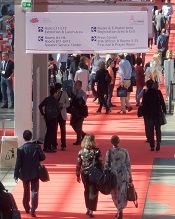
Congress of the European
Hematology Association
COPENHAGEN—Results of the phase 3 PATCH trial suggest that platelet transfusions are not beneficial and can actually cause harm in patients with intracerebral hemorrhage (ICH) associated with antiplatelet therapy.
The study showed that the odds of death or dependence at 3 months were significantly higher among patients who received a platelet transfusion plus standard care than among patients who received standard care alone.
Patients who received a platelet transfusion also had a higher incidence of severe adverse events (SAEs) during hospital admission.
“PATCH shows that platelet transfusion seems harmful for patients with antiplatelet-associated ICH,” said study investigator Maria Koopman, PhD, of Sanquin Bloodbank in Amsterdam, The Netherlands.
“Pending further evidence, we think that platelet transfusions should not be used in this patient group.”
Dr Koopman presented results of the PATCH trial at the 21st Congress of the European Hematology Association (abstract LB2234). The study was also recently published in The Lancet.
Dr Koopman noted that, worldwide, there are 2 million cases of ICH each year, and more than 25% of these patients are taking antiplatelet therapy at ICH onset.
She and her colleagues theorized that because antiplatelet therapy can lead to hematoma growth and poor outcomes, platelet transfusions might modify the effect of antiplatelet therapy and improve patient outcomes.
To test this theory, the team studied ICH patients treated at 60 hospitals in The Netherlands, Scotland, and France.
Patients and treatment
The study included patients with spontaneous supratentorial ICH who were 18 years of age or older, had been using antiplatelet therapy for at least 7 days preceding ICH, and had a Glasgow Coma Scale score of 8 or higher.
The patients were randomized 1:1 to receive either standard care alone or standard care plus a platelet transfusion within 6 hours of the start of symptoms and within 90 minutes of diagnostic brain imaging.
In all, 190 patients were randomized—97 to the transfusion arm and 93 to the standard care arm. Ultimately, 93 patients actually received a platelet transfusion, and 91 received standard care alone.
Patient characteristics were generally balanced between the treatment arms. The mean age was 74.2 in the transfusion arm and 73.5 in the standard care arm. Median scores on the Glasgow Coma Scale were 14 (range, 13-15) and 15 (range, 13-15), respectively.
Comorbidities included cerebral infarction (38.4% and 40%, respectively), hypertension (72.3% and 72.8%, respectively), diabetes (15.5% and 18.9%, respectively), myocardial infarction (23.6% and 24.4%, respectively), and peripheral artery disease (16.5% and 4.4%, respectively).
Antiplatelet therapy consisted of a cyclooxygenase (COX) inhibitor (73.2% and 83.9%, respectively), a COX inhibitor plus dipyridamole (18.6% and 14%, respectively), an adenosine diphosphate (ADP) receptor inhibitor (4.1% and 1.1%, respectively), and an ADP inhibitor plus a COX inhibitor (3.1% and 1.1%, respectively).
Efficacy
The study’s primary outcome was a shift toward death or dependence, rated on the modified Rankin Scale (mRS), at 3 months after ICH, adjusted for hospital, antiplatelet therapy, and ICH score. The primary analysis was done in the intention-to-treat population (n=97 in the transfusion arm and 93 in the standard care arm).
The investigators found the odds of death or dependence at 3 months were higher in the platelet transfusion arm than the standard care arm. The adjusted common odds ratio (OR) was 2.05 (95% CI 1.18-3.56; P=0.0114).
The study’s secondary endpoints were survival at 3 months, poor outcome (dichotomous mRS 4-6 or 3-6) at 3 months, and hematoma growth on imaging within 24 hours.
The survival rate was lower in the transfusion arm than the standard care arm, although the difference was not statistically significant—68% and 77.4%, respectively (OR=0.62; 95% CI, 0.33-1.19; P=0.15).
Poor outcome was more likely in the transfusion arm than the standard care arm, with 72.2% and 55.9% of patients, respectively, having an mRS score of 4-6 (OR=2.04; 95% CI, 1.12-3.74; P=0.0195) and 88.7% and 81.7%, respectively, having an mRS score of 3-6 (OR=1.75; 95% CI, 0.77-3.97; P=0.18).
And there was no significant difference between the arms when it came to hematoma growth, with a median of 2.01 mL (interquartile range, 0.32-9.34) in the transfusion arm and 1.16 mL (interquartile range, 0.03-4.42) in the standard care arm (P=0.81).
Safety
Safety endpoints included thromboembolic events, transfusion reactions, and SAEs during hospital admission. The safety analysis was done in the intention-to-treat population (n=97 in the transfusion arm and 93 in the standard care arm) and the as-treated population (n=93 and 91, respectively).
In the as-treated population, the incidence of SAEs was 42% in the transfusion arm and 29% in the standard care arm (OR=1.74; 95% CI, 0.96-3.17). The incidence of any fatal SAE was 24% and 17%, respectively (OR=1.58; 95% CI, 1.77-3.22).
The incidence of SAEs due to ICH was 25% and 14%, respectively (OR=2.13; 95% CI, 1.01-4.50). The incidence of SAEs due to thromboembolism was 4% and 1%, respectively (OR=4.13; 95% CI, 0.45-37.67). And there was 1 SAE due to transfusion (OR=3.03; 95% CI, 0.12-75.37). ![]()

Congress of the European
Hematology Association
COPENHAGEN—Results of the phase 3 PATCH trial suggest that platelet transfusions are not beneficial and can actually cause harm in patients with intracerebral hemorrhage (ICH) associated with antiplatelet therapy.
The study showed that the odds of death or dependence at 3 months were significantly higher among patients who received a platelet transfusion plus standard care than among patients who received standard care alone.
Patients who received a platelet transfusion also had a higher incidence of severe adverse events (SAEs) during hospital admission.
“PATCH shows that platelet transfusion seems harmful for patients with antiplatelet-associated ICH,” said study investigator Maria Koopman, PhD, of Sanquin Bloodbank in Amsterdam, The Netherlands.
“Pending further evidence, we think that platelet transfusions should not be used in this patient group.”
Dr Koopman presented results of the PATCH trial at the 21st Congress of the European Hematology Association (abstract LB2234). The study was also recently published in The Lancet.
Dr Koopman noted that, worldwide, there are 2 million cases of ICH each year, and more than 25% of these patients are taking antiplatelet therapy at ICH onset.
She and her colleagues theorized that because antiplatelet therapy can lead to hematoma growth and poor outcomes, platelet transfusions might modify the effect of antiplatelet therapy and improve patient outcomes.
To test this theory, the team studied ICH patients treated at 60 hospitals in The Netherlands, Scotland, and France.
Patients and treatment
The study included patients with spontaneous supratentorial ICH who were 18 years of age or older, had been using antiplatelet therapy for at least 7 days preceding ICH, and had a Glasgow Coma Scale score of 8 or higher.
The patients were randomized 1:1 to receive either standard care alone or standard care plus a platelet transfusion within 6 hours of the start of symptoms and within 90 minutes of diagnostic brain imaging.
In all, 190 patients were randomized—97 to the transfusion arm and 93 to the standard care arm. Ultimately, 93 patients actually received a platelet transfusion, and 91 received standard care alone.
Patient characteristics were generally balanced between the treatment arms. The mean age was 74.2 in the transfusion arm and 73.5 in the standard care arm. Median scores on the Glasgow Coma Scale were 14 (range, 13-15) and 15 (range, 13-15), respectively.
Comorbidities included cerebral infarction (38.4% and 40%, respectively), hypertension (72.3% and 72.8%, respectively), diabetes (15.5% and 18.9%, respectively), myocardial infarction (23.6% and 24.4%, respectively), and peripheral artery disease (16.5% and 4.4%, respectively).
Antiplatelet therapy consisted of a cyclooxygenase (COX) inhibitor (73.2% and 83.9%, respectively), a COX inhibitor plus dipyridamole (18.6% and 14%, respectively), an adenosine diphosphate (ADP) receptor inhibitor (4.1% and 1.1%, respectively), and an ADP inhibitor plus a COX inhibitor (3.1% and 1.1%, respectively).
Efficacy
The study’s primary outcome was a shift toward death or dependence, rated on the modified Rankin Scale (mRS), at 3 months after ICH, adjusted for hospital, antiplatelet therapy, and ICH score. The primary analysis was done in the intention-to-treat population (n=97 in the transfusion arm and 93 in the standard care arm).
The investigators found the odds of death or dependence at 3 months were higher in the platelet transfusion arm than the standard care arm. The adjusted common odds ratio (OR) was 2.05 (95% CI 1.18-3.56; P=0.0114).
The study’s secondary endpoints were survival at 3 months, poor outcome (dichotomous mRS 4-6 or 3-6) at 3 months, and hematoma growth on imaging within 24 hours.
The survival rate was lower in the transfusion arm than the standard care arm, although the difference was not statistically significant—68% and 77.4%, respectively (OR=0.62; 95% CI, 0.33-1.19; P=0.15).
Poor outcome was more likely in the transfusion arm than the standard care arm, with 72.2% and 55.9% of patients, respectively, having an mRS score of 4-6 (OR=2.04; 95% CI, 1.12-3.74; P=0.0195) and 88.7% and 81.7%, respectively, having an mRS score of 3-6 (OR=1.75; 95% CI, 0.77-3.97; P=0.18).
And there was no significant difference between the arms when it came to hematoma growth, with a median of 2.01 mL (interquartile range, 0.32-9.34) in the transfusion arm and 1.16 mL (interquartile range, 0.03-4.42) in the standard care arm (P=0.81).
Safety
Safety endpoints included thromboembolic events, transfusion reactions, and SAEs during hospital admission. The safety analysis was done in the intention-to-treat population (n=97 in the transfusion arm and 93 in the standard care arm) and the as-treated population (n=93 and 91, respectively).
In the as-treated population, the incidence of SAEs was 42% in the transfusion arm and 29% in the standard care arm (OR=1.74; 95% CI, 0.96-3.17). The incidence of any fatal SAE was 24% and 17%, respectively (OR=1.58; 95% CI, 1.77-3.22).
The incidence of SAEs due to ICH was 25% and 14%, respectively (OR=2.13; 95% CI, 1.01-4.50). The incidence of SAEs due to thromboembolism was 4% and 1%, respectively (OR=4.13; 95% CI, 0.45-37.67). And there was 1 SAE due to transfusion (OR=3.03; 95% CI, 0.12-75.37). ![]()

Congress of the European
Hematology Association
COPENHAGEN—Results of the phase 3 PATCH trial suggest that platelet transfusions are not beneficial and can actually cause harm in patients with intracerebral hemorrhage (ICH) associated with antiplatelet therapy.
The study showed that the odds of death or dependence at 3 months were significantly higher among patients who received a platelet transfusion plus standard care than among patients who received standard care alone.
Patients who received a platelet transfusion also had a higher incidence of severe adverse events (SAEs) during hospital admission.
“PATCH shows that platelet transfusion seems harmful for patients with antiplatelet-associated ICH,” said study investigator Maria Koopman, PhD, of Sanquin Bloodbank in Amsterdam, The Netherlands.
“Pending further evidence, we think that platelet transfusions should not be used in this patient group.”
Dr Koopman presented results of the PATCH trial at the 21st Congress of the European Hematology Association (abstract LB2234). The study was also recently published in The Lancet.
Dr Koopman noted that, worldwide, there are 2 million cases of ICH each year, and more than 25% of these patients are taking antiplatelet therapy at ICH onset.
She and her colleagues theorized that because antiplatelet therapy can lead to hematoma growth and poor outcomes, platelet transfusions might modify the effect of antiplatelet therapy and improve patient outcomes.
To test this theory, the team studied ICH patients treated at 60 hospitals in The Netherlands, Scotland, and France.
Patients and treatment
The study included patients with spontaneous supratentorial ICH who were 18 years of age or older, had been using antiplatelet therapy for at least 7 days preceding ICH, and had a Glasgow Coma Scale score of 8 or higher.
The patients were randomized 1:1 to receive either standard care alone or standard care plus a platelet transfusion within 6 hours of the start of symptoms and within 90 minutes of diagnostic brain imaging.
In all, 190 patients were randomized—97 to the transfusion arm and 93 to the standard care arm. Ultimately, 93 patients actually received a platelet transfusion, and 91 received standard care alone.
Patient characteristics were generally balanced between the treatment arms. The mean age was 74.2 in the transfusion arm and 73.5 in the standard care arm. Median scores on the Glasgow Coma Scale were 14 (range, 13-15) and 15 (range, 13-15), respectively.
Comorbidities included cerebral infarction (38.4% and 40%, respectively), hypertension (72.3% and 72.8%, respectively), diabetes (15.5% and 18.9%, respectively), myocardial infarction (23.6% and 24.4%, respectively), and peripheral artery disease (16.5% and 4.4%, respectively).
Antiplatelet therapy consisted of a cyclooxygenase (COX) inhibitor (73.2% and 83.9%, respectively), a COX inhibitor plus dipyridamole (18.6% and 14%, respectively), an adenosine diphosphate (ADP) receptor inhibitor (4.1% and 1.1%, respectively), and an ADP inhibitor plus a COX inhibitor (3.1% and 1.1%, respectively).
Efficacy
The study’s primary outcome was a shift toward death or dependence, rated on the modified Rankin Scale (mRS), at 3 months after ICH, adjusted for hospital, antiplatelet therapy, and ICH score. The primary analysis was done in the intention-to-treat population (n=97 in the transfusion arm and 93 in the standard care arm).
The investigators found the odds of death or dependence at 3 months were higher in the platelet transfusion arm than the standard care arm. The adjusted common odds ratio (OR) was 2.05 (95% CI 1.18-3.56; P=0.0114).
The study’s secondary endpoints were survival at 3 months, poor outcome (dichotomous mRS 4-6 or 3-6) at 3 months, and hematoma growth on imaging within 24 hours.
The survival rate was lower in the transfusion arm than the standard care arm, although the difference was not statistically significant—68% and 77.4%, respectively (OR=0.62; 95% CI, 0.33-1.19; P=0.15).
Poor outcome was more likely in the transfusion arm than the standard care arm, with 72.2% and 55.9% of patients, respectively, having an mRS score of 4-6 (OR=2.04; 95% CI, 1.12-3.74; P=0.0195) and 88.7% and 81.7%, respectively, having an mRS score of 3-6 (OR=1.75; 95% CI, 0.77-3.97; P=0.18).
And there was no significant difference between the arms when it came to hematoma growth, with a median of 2.01 mL (interquartile range, 0.32-9.34) in the transfusion arm and 1.16 mL (interquartile range, 0.03-4.42) in the standard care arm (P=0.81).
Safety
Safety endpoints included thromboembolic events, transfusion reactions, and SAEs during hospital admission. The safety analysis was done in the intention-to-treat population (n=97 in the transfusion arm and 93 in the standard care arm) and the as-treated population (n=93 and 91, respectively).
In the as-treated population, the incidence of SAEs was 42% in the transfusion arm and 29% in the standard care arm (OR=1.74; 95% CI, 0.96-3.17). The incidence of any fatal SAE was 24% and 17%, respectively (OR=1.58; 95% CI, 1.77-3.22).
The incidence of SAEs due to ICH was 25% and 14%, respectively (OR=2.13; 95% CI, 1.01-4.50). The incidence of SAEs due to thromboembolism was 4% and 1%, respectively (OR=4.13; 95% CI, 0.45-37.67). And there was 1 SAE due to transfusion (OR=3.03; 95% CI, 0.12-75.37). ![]()
FDA authorizes use of new Zika assay
The US Food and Drug Administration (FDA) has granted emergency use authorization (EUA) for a new assay designed to detect Zika virus infection.
The Aptima® Zika Virus assay is a molecular diagnostic tool that can be used to detect RNA from the Zika virus in human serum and plasma specimens.
The assay has not been FDA-cleared or approved. An EUA allows for the use of unapproved medical products or unapproved uses of approved medical products in an emergency.
The products must be used to diagnose, treat, or prevent serious or life-threatening conditions caused by chemical, biological, radiological, or nuclear threat agents, when there are no adequate alternatives.
This means the Aptima Zika Virus assay is only authorized as long as circumstances exist to justify the authorization of the emergency use of in vitro diagnostics for the detection of Zika virus under section 564(b)(1) of the Federal Food, Drug & Cosmetic Act, 21 U.S.C.§360bbb-3(b)(1), unless the authorization is terminated or revoked sooner.
About the assay
The Aptima Zika Virus assay was developed by Hologic, Inc. The assay runs on the Hologic Panther® system, an integrated platform that fully automates all aspects of nucleic acid amplification testing.
The Aptima Zika Virus assay will be available for use in all 50 states, Puerto Rico, and US territories.
The assay is designed to be used in individuals meeting Centers for Disease Control and Prevention (CDC) Zika virus clinical criteria (eg, clinical signs and symptoms associated with Zika virus infection) and/or CDC Zika virus epidemiological criteria (eg, history of residence in or travel to a geographic region with active Zika transmission at the time of travel, or other epidemiologic criteria for which Zika virus testing may be indicated), by laboratories in the US that are certified under the Clinical Laboratory Improvement Amendments of 1988, 42 U.S.C. § 263a, to perform high complexity tests, or by similarly qualified non-US laboratories.
For more information about the Aptima Zika Virus assay, visit www.hologic.com/zika.
About Zika testing
The FDA has granted EUAs for 4 other tests designed to detect Zika virus:
- RealStar® Zika Virus RT-PCR Kit U.S. (altona Diagnostics GmbH)
- Zika Virus RNA Qualitative Real-Time RT-PCR test (Focus Diagnostics)
- Trioplex Real-time RT-PCR Assay (CDC)
- Zika IgM Antibody Capture Enzyme-Linked Immunosorbent Assay (Zika MAC-ELISA, CDC).
The FDA has also authorized use of the cobas® Zika test (Roche) to screen blood donations for Zika virus. The test may be used under an investigational new drug application for screening donated blood in areas with active mosquito-borne transmission of the virus. ![]()
The US Food and Drug Administration (FDA) has granted emergency use authorization (EUA) for a new assay designed to detect Zika virus infection.
The Aptima® Zika Virus assay is a molecular diagnostic tool that can be used to detect RNA from the Zika virus in human serum and plasma specimens.
The assay has not been FDA-cleared or approved. An EUA allows for the use of unapproved medical products or unapproved uses of approved medical products in an emergency.
The products must be used to diagnose, treat, or prevent serious or life-threatening conditions caused by chemical, biological, radiological, or nuclear threat agents, when there are no adequate alternatives.
This means the Aptima Zika Virus assay is only authorized as long as circumstances exist to justify the authorization of the emergency use of in vitro diagnostics for the detection of Zika virus under section 564(b)(1) of the Federal Food, Drug & Cosmetic Act, 21 U.S.C.§360bbb-3(b)(1), unless the authorization is terminated or revoked sooner.
About the assay
The Aptima Zika Virus assay was developed by Hologic, Inc. The assay runs on the Hologic Panther® system, an integrated platform that fully automates all aspects of nucleic acid amplification testing.
The Aptima Zika Virus assay will be available for use in all 50 states, Puerto Rico, and US territories.
The assay is designed to be used in individuals meeting Centers for Disease Control and Prevention (CDC) Zika virus clinical criteria (eg, clinical signs and symptoms associated with Zika virus infection) and/or CDC Zika virus epidemiological criteria (eg, history of residence in or travel to a geographic region with active Zika transmission at the time of travel, or other epidemiologic criteria for which Zika virus testing may be indicated), by laboratories in the US that are certified under the Clinical Laboratory Improvement Amendments of 1988, 42 U.S.C. § 263a, to perform high complexity tests, or by similarly qualified non-US laboratories.
For more information about the Aptima Zika Virus assay, visit www.hologic.com/zika.
About Zika testing
The FDA has granted EUAs for 4 other tests designed to detect Zika virus:
- RealStar® Zika Virus RT-PCR Kit U.S. (altona Diagnostics GmbH)
- Zika Virus RNA Qualitative Real-Time RT-PCR test (Focus Diagnostics)
- Trioplex Real-time RT-PCR Assay (CDC)
- Zika IgM Antibody Capture Enzyme-Linked Immunosorbent Assay (Zika MAC-ELISA, CDC).
The FDA has also authorized use of the cobas® Zika test (Roche) to screen blood donations for Zika virus. The test may be used under an investigational new drug application for screening donated blood in areas with active mosquito-borne transmission of the virus. ![]()
The US Food and Drug Administration (FDA) has granted emergency use authorization (EUA) for a new assay designed to detect Zika virus infection.
The Aptima® Zika Virus assay is a molecular diagnostic tool that can be used to detect RNA from the Zika virus in human serum and plasma specimens.
The assay has not been FDA-cleared or approved. An EUA allows for the use of unapproved medical products or unapproved uses of approved medical products in an emergency.
The products must be used to diagnose, treat, or prevent serious or life-threatening conditions caused by chemical, biological, radiological, or nuclear threat agents, when there are no adequate alternatives.
This means the Aptima Zika Virus assay is only authorized as long as circumstances exist to justify the authorization of the emergency use of in vitro diagnostics for the detection of Zika virus under section 564(b)(1) of the Federal Food, Drug & Cosmetic Act, 21 U.S.C.§360bbb-3(b)(1), unless the authorization is terminated or revoked sooner.
About the assay
The Aptima Zika Virus assay was developed by Hologic, Inc. The assay runs on the Hologic Panther® system, an integrated platform that fully automates all aspects of nucleic acid amplification testing.
The Aptima Zika Virus assay will be available for use in all 50 states, Puerto Rico, and US territories.
The assay is designed to be used in individuals meeting Centers for Disease Control and Prevention (CDC) Zika virus clinical criteria (eg, clinical signs and symptoms associated with Zika virus infection) and/or CDC Zika virus epidemiological criteria (eg, history of residence in or travel to a geographic region with active Zika transmission at the time of travel, or other epidemiologic criteria for which Zika virus testing may be indicated), by laboratories in the US that are certified under the Clinical Laboratory Improvement Amendments of 1988, 42 U.S.C. § 263a, to perform high complexity tests, or by similarly qualified non-US laboratories.
For more information about the Aptima Zika Virus assay, visit www.hologic.com/zika.
About Zika testing
The FDA has granted EUAs for 4 other tests designed to detect Zika virus:
- RealStar® Zika Virus RT-PCR Kit U.S. (altona Diagnostics GmbH)
- Zika Virus RNA Qualitative Real-Time RT-PCR test (Focus Diagnostics)
- Trioplex Real-time RT-PCR Assay (CDC)
- Zika IgM Antibody Capture Enzyme-Linked Immunosorbent Assay (Zika MAC-ELISA, CDC).
The FDA has also authorized use of the cobas® Zika test (Roche) to screen blood donations for Zika virus. The test may be used under an investigational new drug application for screening donated blood in areas with active mosquito-borne transmission of the virus. ![]()
Estimating the number of sports-related concussions in U.S. children
Between 1.1 million and 1.9 million sports- and recreation-related concussions (SRRCs) occur annually in U.S. children aged 18 years and under, according to a new study.
In the United States, more than 44 million children participate in sports annually, yet the number of SRRCs is unknown. “One challenge in calculating the incidence of SRRCs is that injured youth may not receive treatment, or may receive care from a variety of providers including certified athletic trainers, primary care, and emergency medicine physicians,” said Dr. Mersine A. Bryan of the University of Washington, Seattle, and her associates.
Three national databases were used in this study to conduct research for 2013. “Incidence rates were calculated on the basis of the number of claims divided by the number of enrollees,” they said.
Of children with SRRCs seen in health care settings, outpatient treatment had the highest number at 377,978 visits. The emergency department received between 115,479 and 166,929 sports-related visits, and there were 2,886-4,936 actual hospitalizations. Athletic trainer visits for all school sports totaled 85,885. The number of SRRCs not seen by any health care provider was estimated at 511,590-1,240,972.
The Centers for Disease Control and Prevention is currently developing a surveillance system for SRRCs that would include recreational sources of concussion.
Find the full study at the Journal of Pediatrics (2016 Jun 20. doi: 10.1542/peds.2015-4635).
Between 1.1 million and 1.9 million sports- and recreation-related concussions (SRRCs) occur annually in U.S. children aged 18 years and under, according to a new study.
In the United States, more than 44 million children participate in sports annually, yet the number of SRRCs is unknown. “One challenge in calculating the incidence of SRRCs is that injured youth may not receive treatment, or may receive care from a variety of providers including certified athletic trainers, primary care, and emergency medicine physicians,” said Dr. Mersine A. Bryan of the University of Washington, Seattle, and her associates.
Three national databases were used in this study to conduct research for 2013. “Incidence rates were calculated on the basis of the number of claims divided by the number of enrollees,” they said.
Of children with SRRCs seen in health care settings, outpatient treatment had the highest number at 377,978 visits. The emergency department received between 115,479 and 166,929 sports-related visits, and there were 2,886-4,936 actual hospitalizations. Athletic trainer visits for all school sports totaled 85,885. The number of SRRCs not seen by any health care provider was estimated at 511,590-1,240,972.
The Centers for Disease Control and Prevention is currently developing a surveillance system for SRRCs that would include recreational sources of concussion.
Find the full study at the Journal of Pediatrics (2016 Jun 20. doi: 10.1542/peds.2015-4635).
Between 1.1 million and 1.9 million sports- and recreation-related concussions (SRRCs) occur annually in U.S. children aged 18 years and under, according to a new study.
In the United States, more than 44 million children participate in sports annually, yet the number of SRRCs is unknown. “One challenge in calculating the incidence of SRRCs is that injured youth may not receive treatment, or may receive care from a variety of providers including certified athletic trainers, primary care, and emergency medicine physicians,” said Dr. Mersine A. Bryan of the University of Washington, Seattle, and her associates.
Three national databases were used in this study to conduct research for 2013. “Incidence rates were calculated on the basis of the number of claims divided by the number of enrollees,” they said.
Of children with SRRCs seen in health care settings, outpatient treatment had the highest number at 377,978 visits. The emergency department received between 115,479 and 166,929 sports-related visits, and there were 2,886-4,936 actual hospitalizations. Athletic trainer visits for all school sports totaled 85,885. The number of SRRCs not seen by any health care provider was estimated at 511,590-1,240,972.
The Centers for Disease Control and Prevention is currently developing a surveillance system for SRRCs that would include recreational sources of concussion.
Find the full study at the Journal of Pediatrics (2016 Jun 20. doi: 10.1542/peds.2015-4635).
FROM THE JOURNAL OF PEDIATRICS
Hospital-acquired respiratory viruses cause significant morbidity, mortality
BOSTON – Hospital-acquired respiratory viral infections may be a significant and underappreciated cause of morbidity and mortality among hospitalized patients.
According to a multisite, retrospective chart review of 44 patients with hospital-acquired respiratory viral illnesses (HA-RVIs), 17 patients (39%) died in-hospital. Further, of the 27 who survived, 18 (66.6%) were discharged to an advanced care setting rather than to home, though just 11/44 (25%) had been living in an advanced care setting before admission.
For the hospitalizations complicated by HA-RVI, the average length of stay was 30.4 days, with a positive respiratory virus panel (RVP) result occurring at a mean 18 days after admission.
“HA-RVIs are an underappreciated event and appear to target the sickest patients in the hospital,” said coauthor Dr. Matthew Sims, director of infectious diseases research at Beaumont Hospital, Rochester, Mich., at a poster session of the annual meeting of the American Society of Microbiology.
First author Dr. Adam K. Skrzynski, also of Beaumont Health, and his coauthors performed the analysis of 4,065 patients with a positive RVP result during hospitalization at a regional hospital system in the September 2011-May 2015 study period; the 1.1% of patients with positive results who formed the study cohort had to have symptoms of a respiratory infection occurring after more than 5 days of hospitalization. Mortality data were collected for the first 33 days of hospitalization.
Positive RVP results for those included in the study came primarily from nasopharyngeal swab (n = 32), with the remainder from bronchoalveolar lavage (n = 11) and sputum (n = 1). Most patients were female (29/44, 66%), and elderly, with an average age of 73.8 years. In an interview, Dr. Sims said that many patients were smokers, and that chronic obstructive pulmonary disease and obesity were common comorbidities.
The prognosis was particularly grim for the 12 patients (27.3%) who were admitted to the ICU: 10 (83.3%) died after an average 9.6 days in the ICU. Advanced interventions did not seem to make a difference, either. “Intubation didn’t help these patients,” said Dr. Sims. Nine patients (20.5%) were intubated within 7 days of their positive RVP results. Intubation lasted an average 7.6 days, and all nine of these patients died.
The RVP came into use in 2011 and made it possible to identify whether a respiratory virus was causing symptoms – and which virus was the culprit – said Dr. Sims. For the studied population, 13 of 44 patients had influenza; 11 of those had influenza A and 2 had influenza B. The next most common pathogen was parainfluenza, with 10 positive RVP results.
Dr. Sims said he and his coinvestigators were surprised to find that, although influenza A was the most common pathogen, only 18.8% of the patients with influenza A died during the study period. “While it is possible that the high frequency of influenza infection in our study may be due to poor vaccine-strain matching for the years in question, the lower mortality rate seen in influenza A infection may be due to our hospital’s mandatory influenza vaccination policy and subsequent protection against mortality,” Dr. Skrzynski and his coauthors wrote.
There were seasonal trends in mortality, with 70.6% of mortality occurring in the spring (April-June) and an additional 23.3% happening in the winter (January-March). Parainfluenza infection peaked in the spring, and influenza peaked in the winter months.
Dr. Sims said the study underlines the importance of encouraging ill hospital staff members to stay home, and family members with respiratory symptoms should not be visiting fragile patients. Dr. Skrzynski and his coauthors also wrote that “immunization of healthcare personnel against influenza should be mandatory.”
Still to be answered, said Dr. Sims, is the association between comorbidities and the potentially lethal effects of HA-RVIs. They are currently performing a matched case-control study to tease out these relationships.
Dr. Skrzynski reported no outside funding source, and the study authors had no financial disclosures.
On Twitter @karioakes
BOSTON – Hospital-acquired respiratory viral infections may be a significant and underappreciated cause of morbidity and mortality among hospitalized patients.
According to a multisite, retrospective chart review of 44 patients with hospital-acquired respiratory viral illnesses (HA-RVIs), 17 patients (39%) died in-hospital. Further, of the 27 who survived, 18 (66.6%) were discharged to an advanced care setting rather than to home, though just 11/44 (25%) had been living in an advanced care setting before admission.
For the hospitalizations complicated by HA-RVI, the average length of stay was 30.4 days, with a positive respiratory virus panel (RVP) result occurring at a mean 18 days after admission.
“HA-RVIs are an underappreciated event and appear to target the sickest patients in the hospital,” said coauthor Dr. Matthew Sims, director of infectious diseases research at Beaumont Hospital, Rochester, Mich., at a poster session of the annual meeting of the American Society of Microbiology.
First author Dr. Adam K. Skrzynski, also of Beaumont Health, and his coauthors performed the analysis of 4,065 patients with a positive RVP result during hospitalization at a regional hospital system in the September 2011-May 2015 study period; the 1.1% of patients with positive results who formed the study cohort had to have symptoms of a respiratory infection occurring after more than 5 days of hospitalization. Mortality data were collected for the first 33 days of hospitalization.
Positive RVP results for those included in the study came primarily from nasopharyngeal swab (n = 32), with the remainder from bronchoalveolar lavage (n = 11) and sputum (n = 1). Most patients were female (29/44, 66%), and elderly, with an average age of 73.8 years. In an interview, Dr. Sims said that many patients were smokers, and that chronic obstructive pulmonary disease and obesity were common comorbidities.
The prognosis was particularly grim for the 12 patients (27.3%) who were admitted to the ICU: 10 (83.3%) died after an average 9.6 days in the ICU. Advanced interventions did not seem to make a difference, either. “Intubation didn’t help these patients,” said Dr. Sims. Nine patients (20.5%) were intubated within 7 days of their positive RVP results. Intubation lasted an average 7.6 days, and all nine of these patients died.
The RVP came into use in 2011 and made it possible to identify whether a respiratory virus was causing symptoms – and which virus was the culprit – said Dr. Sims. For the studied population, 13 of 44 patients had influenza; 11 of those had influenza A and 2 had influenza B. The next most common pathogen was parainfluenza, with 10 positive RVP results.
Dr. Sims said he and his coinvestigators were surprised to find that, although influenza A was the most common pathogen, only 18.8% of the patients with influenza A died during the study period. “While it is possible that the high frequency of influenza infection in our study may be due to poor vaccine-strain matching for the years in question, the lower mortality rate seen in influenza A infection may be due to our hospital’s mandatory influenza vaccination policy and subsequent protection against mortality,” Dr. Skrzynski and his coauthors wrote.
There were seasonal trends in mortality, with 70.6% of mortality occurring in the spring (April-June) and an additional 23.3% happening in the winter (January-March). Parainfluenza infection peaked in the spring, and influenza peaked in the winter months.
Dr. Sims said the study underlines the importance of encouraging ill hospital staff members to stay home, and family members with respiratory symptoms should not be visiting fragile patients. Dr. Skrzynski and his coauthors also wrote that “immunization of healthcare personnel against influenza should be mandatory.”
Still to be answered, said Dr. Sims, is the association between comorbidities and the potentially lethal effects of HA-RVIs. They are currently performing a matched case-control study to tease out these relationships.
Dr. Skrzynski reported no outside funding source, and the study authors had no financial disclosures.
On Twitter @karioakes
BOSTON – Hospital-acquired respiratory viral infections may be a significant and underappreciated cause of morbidity and mortality among hospitalized patients.
According to a multisite, retrospective chart review of 44 patients with hospital-acquired respiratory viral illnesses (HA-RVIs), 17 patients (39%) died in-hospital. Further, of the 27 who survived, 18 (66.6%) were discharged to an advanced care setting rather than to home, though just 11/44 (25%) had been living in an advanced care setting before admission.
For the hospitalizations complicated by HA-RVI, the average length of stay was 30.4 days, with a positive respiratory virus panel (RVP) result occurring at a mean 18 days after admission.
“HA-RVIs are an underappreciated event and appear to target the sickest patients in the hospital,” said coauthor Dr. Matthew Sims, director of infectious diseases research at Beaumont Hospital, Rochester, Mich., at a poster session of the annual meeting of the American Society of Microbiology.
First author Dr. Adam K. Skrzynski, also of Beaumont Health, and his coauthors performed the analysis of 4,065 patients with a positive RVP result during hospitalization at a regional hospital system in the September 2011-May 2015 study period; the 1.1% of patients with positive results who formed the study cohort had to have symptoms of a respiratory infection occurring after more than 5 days of hospitalization. Mortality data were collected for the first 33 days of hospitalization.
Positive RVP results for those included in the study came primarily from nasopharyngeal swab (n = 32), with the remainder from bronchoalveolar lavage (n = 11) and sputum (n = 1). Most patients were female (29/44, 66%), and elderly, with an average age of 73.8 years. In an interview, Dr. Sims said that many patients were smokers, and that chronic obstructive pulmonary disease and obesity were common comorbidities.
The prognosis was particularly grim for the 12 patients (27.3%) who were admitted to the ICU: 10 (83.3%) died after an average 9.6 days in the ICU. Advanced interventions did not seem to make a difference, either. “Intubation didn’t help these patients,” said Dr. Sims. Nine patients (20.5%) were intubated within 7 days of their positive RVP results. Intubation lasted an average 7.6 days, and all nine of these patients died.
The RVP came into use in 2011 and made it possible to identify whether a respiratory virus was causing symptoms – and which virus was the culprit – said Dr. Sims. For the studied population, 13 of 44 patients had influenza; 11 of those had influenza A and 2 had influenza B. The next most common pathogen was parainfluenza, with 10 positive RVP results.
Dr. Sims said he and his coinvestigators were surprised to find that, although influenza A was the most common pathogen, only 18.8% of the patients with influenza A died during the study period. “While it is possible that the high frequency of influenza infection in our study may be due to poor vaccine-strain matching for the years in question, the lower mortality rate seen in influenza A infection may be due to our hospital’s mandatory influenza vaccination policy and subsequent protection against mortality,” Dr. Skrzynski and his coauthors wrote.
There were seasonal trends in mortality, with 70.6% of mortality occurring in the spring (April-June) and an additional 23.3% happening in the winter (January-March). Parainfluenza infection peaked in the spring, and influenza peaked in the winter months.
Dr. Sims said the study underlines the importance of encouraging ill hospital staff members to stay home, and family members with respiratory symptoms should not be visiting fragile patients. Dr. Skrzynski and his coauthors also wrote that “immunization of healthcare personnel against influenza should be mandatory.”
Still to be answered, said Dr. Sims, is the association between comorbidities and the potentially lethal effects of HA-RVIs. They are currently performing a matched case-control study to tease out these relationships.
Dr. Skrzynski reported no outside funding source, and the study authors had no financial disclosures.
On Twitter @karioakes
AT ASM MICROBE 2016
Key clinical point: Hospital-acquired respiratory viral illnesses had a 39% mortality rate.
Major finding: Of 44 symptomatic patients with positive respiratory virus panel screens, 17 died and 2/3 of the survivors went to advanced care settings on discharge.
Data source: Retrospective multisite chart review of 44 patients with HA-RVIs and positive RVP screens.
Disclosures: No external funding source was reported, and the study authors had no disclosures.
HCV patients had distinct mucosal microbiome
SAN DIEGO – Patients with hepatitis C virus (HCV) infections had distinct duodenal mucosal microbiomes and greater intestinal permeability, compared with healthy controls and patients with other chronic liver diseases, Dr. Ashok Raj reported.
The findings might one day lead to therapies that aim to restore or normalize the microbiomes of patients with HCV, Dr. Raj said in an interview at the annual Digestive Disease Week.
Chronic liver disease (CLD) has been linked to dysbiosis, or abnormal shifts of the microbiome. But most studies have focused on fecal specimens, and “recent evidence suggests that the mucosal microbiota differ from fecal microbiota,” said Dr. Raj, a gastroenterologist and hepatologist at Princess Alexandra Hospital in Brisbane, Australia, and a PhD candidate at the University of Queensland at Brisbane.
“The small-intestinal mucosal microbiota are of particular interest to us,” Dr. Raj explained. “Anatomically, all the blood from this region of the gut drains into the portal vein and flows directly to the liver. Because of small-intestinal permeability, either bacteria or their products could travel to the liver and contribute to disease. But very little is known about this microbiota in CLD.”
Therefore, Dr. Raj and his associates sequenced bacterial DNA from mucosal biopsies of the second part of the duodenum from 38 prospectively recruited endoscopy patients with CLD and 13 healthy controls. The researchers also evaluated dietary habits, intestinal permeability, hepatic stiffness based on transient elastography, and the presence of metabolic syndrome, as measured by the International Diabetes Federation/American Heart Association/National Heart, Lung, and Blood Institute 2009 Consensus criteria. The CLD group included 28 men and 10 women aged 36-82 years, including 16 patients with HCV, 10 patients with nonalcoholic fatty liver disease, 7 patients with fatty liver disease, 3 patients with autoimmune hepatitis, and 2 patients with hepatitis B virus infection. The controls were between 24 and 73 years old, and 70% were women.
Sequencing of bacteria DNA revealed significant differences between patients and controls, particularly among patients with HCV, Dr. Raj said. The HCV patients not only had significantly less microbial diversity (P less than .02), but the overall changes in their microbiota were significant enough for them to cluster separately from controls and from patients with other types of CLD (P less than .01 for both comparisons). Furthermore, HCV patients had significantly greater small-intestinal permeability (mean ± SD log lactulose to rhamnose ratio, 1.57 ± 0.27) than controls (1.21 ± 0.25; P less than .01) or patients with other CLDs (1.24 ± 0.39; P = .01).
“Additionally, for the HCV patients, dietary fat intake showed a moderately strong positive correlation with intestinal permeability,” Dr. Raj said (r = 0.58; P = .03). “These findings are in keeping with animal models, which have shown that dietary fat can change the microbiota and also increase intestinal permeability.” However, the multivariate analysis found no links between microbial characteristics and hepatic stiffness or metabolic syndrome – perhaps because most patients were “at the cirrhotic end of the spectrum, reflecting their indication for endoscopy,” or because “these relationships are subtler and require larger sample numbers,” he said.
“Patients with HCV may have a unique small-intestinal microbiome,” Dr. Raj concluded. “These patients had higher intestinal permeability, and it is possible that the microbiota have a part to play in that.” Exactly how microbiota and gut permeability contribute to disease remains unclear, but pathology in the small intestine could help explain some features of the HCV trajectory, such as extrahepatic manifestations or variations in disease progression, he added. “Future studies may lead to targeting the small-intestinal gut microbiome to modulate and even treat HCV.”
The study was funded by a postgraduate award from the government of Australia and by the Princess Alexandra Hospital Research Foundation. Dr. Raj had no disclosures.
SAN DIEGO – Patients with hepatitis C virus (HCV) infections had distinct duodenal mucosal microbiomes and greater intestinal permeability, compared with healthy controls and patients with other chronic liver diseases, Dr. Ashok Raj reported.
The findings might one day lead to therapies that aim to restore or normalize the microbiomes of patients with HCV, Dr. Raj said in an interview at the annual Digestive Disease Week.
Chronic liver disease (CLD) has been linked to dysbiosis, or abnormal shifts of the microbiome. But most studies have focused on fecal specimens, and “recent evidence suggests that the mucosal microbiota differ from fecal microbiota,” said Dr. Raj, a gastroenterologist and hepatologist at Princess Alexandra Hospital in Brisbane, Australia, and a PhD candidate at the University of Queensland at Brisbane.
“The small-intestinal mucosal microbiota are of particular interest to us,” Dr. Raj explained. “Anatomically, all the blood from this region of the gut drains into the portal vein and flows directly to the liver. Because of small-intestinal permeability, either bacteria or their products could travel to the liver and contribute to disease. But very little is known about this microbiota in CLD.”
Therefore, Dr. Raj and his associates sequenced bacterial DNA from mucosal biopsies of the second part of the duodenum from 38 prospectively recruited endoscopy patients with CLD and 13 healthy controls. The researchers also evaluated dietary habits, intestinal permeability, hepatic stiffness based on transient elastography, and the presence of metabolic syndrome, as measured by the International Diabetes Federation/American Heart Association/National Heart, Lung, and Blood Institute 2009 Consensus criteria. The CLD group included 28 men and 10 women aged 36-82 years, including 16 patients with HCV, 10 patients with nonalcoholic fatty liver disease, 7 patients with fatty liver disease, 3 patients with autoimmune hepatitis, and 2 patients with hepatitis B virus infection. The controls were between 24 and 73 years old, and 70% were women.
Sequencing of bacteria DNA revealed significant differences between patients and controls, particularly among patients with HCV, Dr. Raj said. The HCV patients not only had significantly less microbial diversity (P less than .02), but the overall changes in their microbiota were significant enough for them to cluster separately from controls and from patients with other types of CLD (P less than .01 for both comparisons). Furthermore, HCV patients had significantly greater small-intestinal permeability (mean ± SD log lactulose to rhamnose ratio, 1.57 ± 0.27) than controls (1.21 ± 0.25; P less than .01) or patients with other CLDs (1.24 ± 0.39; P = .01).
“Additionally, for the HCV patients, dietary fat intake showed a moderately strong positive correlation with intestinal permeability,” Dr. Raj said (r = 0.58; P = .03). “These findings are in keeping with animal models, which have shown that dietary fat can change the microbiota and also increase intestinal permeability.” However, the multivariate analysis found no links between microbial characteristics and hepatic stiffness or metabolic syndrome – perhaps because most patients were “at the cirrhotic end of the spectrum, reflecting their indication for endoscopy,” or because “these relationships are subtler and require larger sample numbers,” he said.
“Patients with HCV may have a unique small-intestinal microbiome,” Dr. Raj concluded. “These patients had higher intestinal permeability, and it is possible that the microbiota have a part to play in that.” Exactly how microbiota and gut permeability contribute to disease remains unclear, but pathology in the small intestine could help explain some features of the HCV trajectory, such as extrahepatic manifestations or variations in disease progression, he added. “Future studies may lead to targeting the small-intestinal gut microbiome to modulate and even treat HCV.”
The study was funded by a postgraduate award from the government of Australia and by the Princess Alexandra Hospital Research Foundation. Dr. Raj had no disclosures.
SAN DIEGO – Patients with hepatitis C virus (HCV) infections had distinct duodenal mucosal microbiomes and greater intestinal permeability, compared with healthy controls and patients with other chronic liver diseases, Dr. Ashok Raj reported.
The findings might one day lead to therapies that aim to restore or normalize the microbiomes of patients with HCV, Dr. Raj said in an interview at the annual Digestive Disease Week.
Chronic liver disease (CLD) has been linked to dysbiosis, or abnormal shifts of the microbiome. But most studies have focused on fecal specimens, and “recent evidence suggests that the mucosal microbiota differ from fecal microbiota,” said Dr. Raj, a gastroenterologist and hepatologist at Princess Alexandra Hospital in Brisbane, Australia, and a PhD candidate at the University of Queensland at Brisbane.
“The small-intestinal mucosal microbiota are of particular interest to us,” Dr. Raj explained. “Anatomically, all the blood from this region of the gut drains into the portal vein and flows directly to the liver. Because of small-intestinal permeability, either bacteria or their products could travel to the liver and contribute to disease. But very little is known about this microbiota in CLD.”
Therefore, Dr. Raj and his associates sequenced bacterial DNA from mucosal biopsies of the second part of the duodenum from 38 prospectively recruited endoscopy patients with CLD and 13 healthy controls. The researchers also evaluated dietary habits, intestinal permeability, hepatic stiffness based on transient elastography, and the presence of metabolic syndrome, as measured by the International Diabetes Federation/American Heart Association/National Heart, Lung, and Blood Institute 2009 Consensus criteria. The CLD group included 28 men and 10 women aged 36-82 years, including 16 patients with HCV, 10 patients with nonalcoholic fatty liver disease, 7 patients with fatty liver disease, 3 patients with autoimmune hepatitis, and 2 patients with hepatitis B virus infection. The controls were between 24 and 73 years old, and 70% were women.
Sequencing of bacteria DNA revealed significant differences between patients and controls, particularly among patients with HCV, Dr. Raj said. The HCV patients not only had significantly less microbial diversity (P less than .02), but the overall changes in their microbiota were significant enough for them to cluster separately from controls and from patients with other types of CLD (P less than .01 for both comparisons). Furthermore, HCV patients had significantly greater small-intestinal permeability (mean ± SD log lactulose to rhamnose ratio, 1.57 ± 0.27) than controls (1.21 ± 0.25; P less than .01) or patients with other CLDs (1.24 ± 0.39; P = .01).
“Additionally, for the HCV patients, dietary fat intake showed a moderately strong positive correlation with intestinal permeability,” Dr. Raj said (r = 0.58; P = .03). “These findings are in keeping with animal models, which have shown that dietary fat can change the microbiota and also increase intestinal permeability.” However, the multivariate analysis found no links between microbial characteristics and hepatic stiffness or metabolic syndrome – perhaps because most patients were “at the cirrhotic end of the spectrum, reflecting their indication for endoscopy,” or because “these relationships are subtler and require larger sample numbers,” he said.
“Patients with HCV may have a unique small-intestinal microbiome,” Dr. Raj concluded. “These patients had higher intestinal permeability, and it is possible that the microbiota have a part to play in that.” Exactly how microbiota and gut permeability contribute to disease remains unclear, but pathology in the small intestine could help explain some features of the HCV trajectory, such as extrahepatic manifestations or variations in disease progression, he added. “Future studies may lead to targeting the small-intestinal gut microbiome to modulate and even treat HCV.”
The study was funded by a postgraduate award from the government of Australia and by the Princess Alexandra Hospital Research Foundation. Dr. Raj had no disclosures.
AT DDW® 2016
Key clinical point: Patients with hepatitis C virus infection had unique mucosal microbiomes, compared with controls or patients with other chronic liver diseases.
Major finding: The HCV patients not only had significantly less microbial diversity (P less than .02), but the overall changes in their microbiota were significant enough for them to cluster separately from controls and from patients with other types of chronic liver disease (P less than .01 for both comparisons).
Data source: Bacterial DNA sequencing of duodenal mucosal biopsies from 38 patients with chronic liver diseases and 10 controls.
Disclosures: The study was funded by a postgraduate award from the government of Australia and by the Princess Alexandra Hospital Research Foundation. Dr. Raj had no disclosures.

